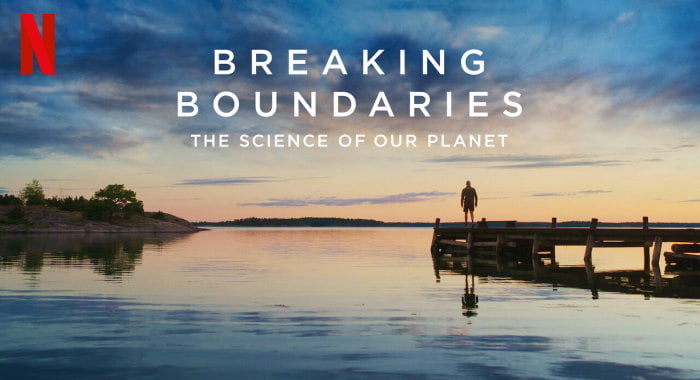It has been almost two months since we posted anything about Sir David Attenborough, which wouldn't seem very long if he was not being so prolific recently, including the wonderful A Life on Our Planet and a powerful address to the UN Security Council.
We have also never posted anything about the work of the world renowned scientist Professor Johan Rockström, an expert on global sustainability issues, and that is a big omission.
It's time to set both of those things right. A new Attenborough narrated documentary just released on Netflix follows the scientific journey of Rockström.
Breaking Boundaries: The Science of Our Planet tells the story of the most important scientific discovery of our time - that human activity has pushed Earth beyond the boundaries that have kept the planet stable for 10,000 years, since the dawn of civilisation. The film takes the audience on a journey of discovery, to explore the planetary thresholds we must not exceed, not just for the stability of our planet, but for the future of humanity. It also offers up some of the solutions we can and must put in place now if we are to protect Earth’s life support systems.
The situation that we are facing and the message behind the documentary are maybe best explained in the words of Johan Rockström himself:
"Humanity has enjoyed a 10,000-year stretch of relative stability on Earth – a state of grace. This stability is the foundation of farming and our civilization. Everything we know and love depends on it.
It is tempting to think this is another climate story. But it is much bigger. It is about Earth’s life support system – the biosphere, a thin veil clinging to the surface of Earth where life thrives. My work is about understanding the interactions between Earth’s climate, ecosystems and life, the ocean and ice sheets, rivers, lakes and soils, forests and farms, the carbon cycle… and people – the economy, governments, consumers. As a species, as a global civilization, we are now in the driver’s seat. We are the main force for change in the biosphere.
But we can raise the drama up a notch. Our children are sitting in the backseat. They are shouting “turn on the headlights.” “Listen to the science.” “This is our future.” Our generation may be the last with the ability to keep our planet within the boundaries we need to thrive and prosper.
The key message from the film is that we still have time. We are an endlessly innovative species. Cooperation is our superpower. And we are beginning to see signs that major change is coming. The science is clear on what humanity needs to do. There are three priorities: cut greenhouse gases to zero, protect the wetlands, soils, forests and oceans that absorb our impacts, and change our diets and the way we farm food. This is the mission. And everyone benefits. We will live in a cleaner, healthier and more peaceful world. Imagine that same car, safely at home and the children asleep in their beds at night."
If David Attenborough and other figures with voices on the natural world and climate change seem to be everywhere right now, then that is only because they truly need to be. This is the moment when it is till possible to take these messages and do something with them before the chance passes us by completely.
As Sir David says: “With major global decisions on biodiversity and climate change taking place this year there has never been a more important time to communicate the science of what is happening to our planet. The research featured in Breaking Boundaries is one of the clearest explanations I’ve seen of the threats we face and how we might tackle them. I hope that after watching this film many more people will see the urgency of our current situation and be inspired by the possibility of creating a stable healthy future for ourselves and the rest of the natural world.”
The only real problem is that not everyone will get to see films with important messages like this, since it comes on a paid streaming service.
Maybe this kind of message needs to be publicly broadcast on every TV channel of every country in the world and shown in every primary school.
In the meantime though, it's available to stream on Netflix globally right now.
